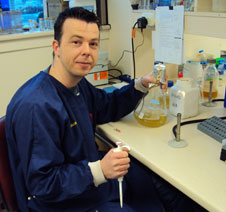
Dr Raymond Staals
Dr Raymond Staals worked as a postdoctoral fellow in the Fineran lab, Department of Microbiology and Immunology. His work was on a bacterial adaptive immune system called CRISPR-Cas. This interview was conducted in 2015.
“CRISPR-Cas provides protection against virtually all sources of incoming foreign DNA, such as viruses and (conjugative) plasmids. The adaptive aspect of this system ensures that the bacterium 'remembers' prior invasions. As such, when the cell is exposed to the same foreign genetic element again, this system can quickly recognise and eliminate the potential threat. My goal is to work out the molecular basis underlying the formation of this genetic memory.
“I really enjoy the combination of tackling fundamental questions on one hand and contributing to potential medical applications on the other.
“I've always been fascinated by how things work, whether it's a TV or a molecular mechanism. I'm still often amazed by the clever approaches scientists use to prove or disprove their hypotheses.
“I do really enjoy working with people that are truly dedicated and enthusiastic. Equally important, I work best in an informal environment with fun colleagues. After meeting Associate Professor Peter Fineran during his sabbatical in The Netherlands, I knew that I would find all these things in Otago. The atmosphere is very relaxed, while still retaining the drive to perform at your best.
“Receiving the Fellowship felt like a confirmation to me that this field of research was more widely appreciated and that a future career for me in science was indeed possible. It enabled me to continue working on the CRISPR-Cas system in an inspiring environment. The financial independence allowed me to work with different collaborators as well. This has had a great impact on my scientific output and keeping my broad interests.
“Of course, moving about 18,000 km from home (The Netherlands) is quite a big step to take; leaving behind all your friends and relatives. Especially since my brother had his first-born in the time I was away.
“You really have to enjoy the work you're doing and be prepared to put in more hours than is written in your job description. There's often competition and getting scooped on a particular research question is one of the worst things that can happen.
“I'm having a great time here with many friendly colleagues and a great research environment. Everybody has been very supportive, not only in the Fineran group, but also in the Department and the Health Sciences Division.”